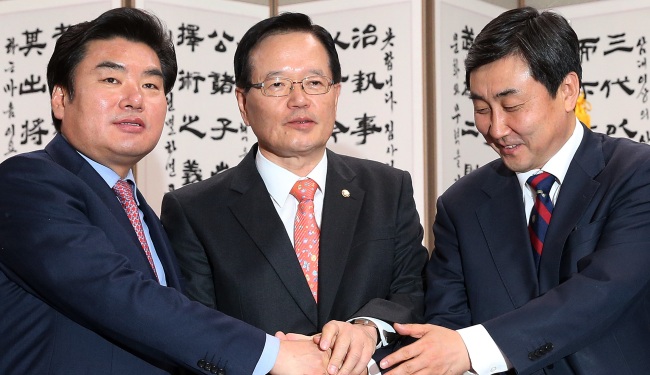The National Assembly on Wednesday passed next year’s budget of 386.4 trillion won ($342.3 billion) after days of bipartisan wrangling. Along with the budget, the Assembly endorsed five economy-related bills fervently pushed by the government as key to preparing for further economic slowdown.
The revised budget is 300 billion won less than the original plan submitted by the government. The budget for publishing state-authored textbooks and subsidies for the panel to investigate the 2014 Sewol sinking remained unchanged from the government’s original plan.
 |
Jung Eui-hwa (center), chairman of the National Assembly, Saenuri Party floor leader Won Yu-chul (left), and New Politics Alliance for Democracy floor leader Lee Jong-kul partake in a meeting before the regular parliamentary session at the National Assembly in Seoul on Wednesday. (Yonhap) |
The ruling Saenuri Party and the main opposition New Politics Alliance for Democracy had wrangled over the government’s budget for state-led child care programs until the later hours in the evening.
The rival parties reportedly agreed to earmark some 300 billion won from reserved funds for the child care program known as “Nuri Process” that President Park Geun-hye had promised during her 2012 presidential campaign. The program is estimated to cost over 2 trillion won in total next year to provide free child care service for all children aged 3 to 5.
While the NPAD urged the central government to take more, or all, of the financial burdens for the program, Saenuri contended that the provincial education offices should fund the program out of their own pockets, citing the revised relevant laws that place the burden on the respective municipalities.
The use of reserved funds instead of directly appropriating a Nuri Process budget is expected to be further opposed by municipalities, which will have to make up for the shortage. The same occurred last year with the government “indirectly” subsidizing the project with some 506.4 billion won from reserved funds.
The negotiation of the budget was further complicated by a deal made between the floor leaders of the rival parties late Tuesday night. NPAD floor leader Rep. Lee Jong-kul and his Saenuri counterpart Rep. Won Yu-chul had agreed to vote on five business-related bills along with the budget in return for a compromise on next year’s financial plan.
The five legislative acts include bills that would relax regulations on medical and tourism businesses to boost the economy.
The medical-related bills aim to give financial support to South Korea’s medical industry, which is looking to enter markets overseas. The NPAD had criticized the bills as an attempt to privatize the medical industry.
The tourism bills allow companies to build hotels near elementary, middle and high schools. The opposition party had also criticized the measure, saying it would only benefit giant hotel chains owned by Korea’s family-owned conglomerates.
The overnight arrangement, however, was opposed fervently by NPAD Rep. Lee Sang-min, who heads the Assembly’s Legislative and Judiciary Committee. The committee is the last stop before a bill is presented to be voted on at a plenary session.
Lee had said the deal overlooked the legal process, as the bills were not yet handed over to his committee for review. The committee typically has up to five days to review each bill.
As Lee continued in his opposition, other relevant standing committees were delayed. The NPAD held a general assembly to discuss the plan as Assembly Speaker Chung Ui-hwa prepared to execute his authority and bypass the legislative committee to present them for plenary votes.
The floor leaders, meanwhile, agreed to hold extra sessions to discuss other contentious bills, including counterterrorism bills, North Korea’s human rights bill and labor reform bills. They agreed they will complete their negotiations and vote on them by no later than Dec. 9, when the regular parliamentary session ends.
By Yeo Jun-suk (
jasonyeo@heraldcorp.com)








